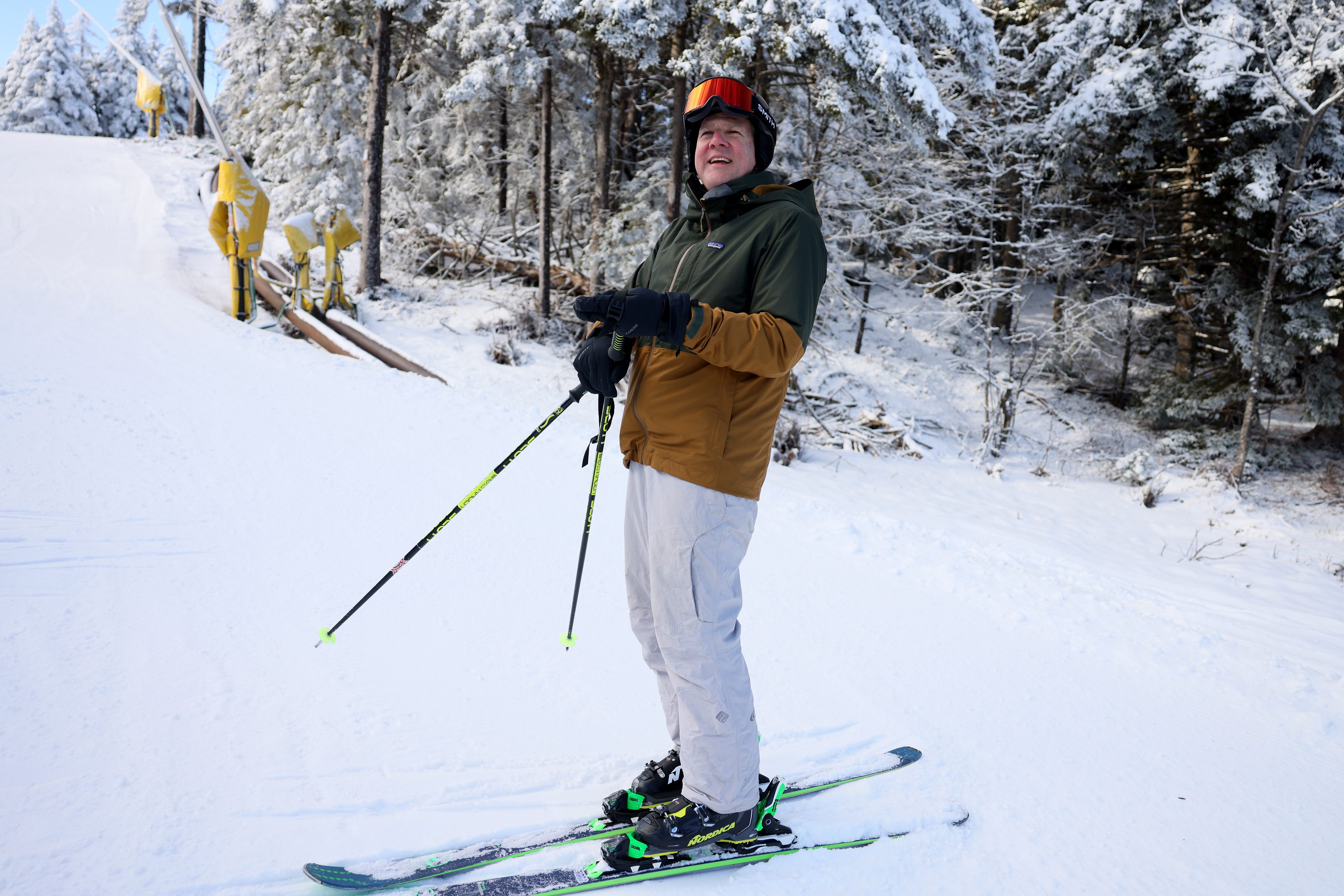The Battle for New Hampshire’s Gunstock Mountain Resort
Throughout New England, the corporate consolidation of ski mountains threatens to wipe out the region's alpine culture and forever change our most beloved ski towns. Except at one enclave, where the locals decided to fight back.

Illustration by Mark Matcho
“Wow,” I said.
I was reading the Laconia Daily Sun one day last July when our family was visiting with my sister’s brood at their New Hampshire place on Lake Winnipesaukee. Theirs is not Mitt’s lakefront spread nor Jimmy Fallon’s secret Wolfeboro digs, but it’s nice and can accompany our four parental types, five next-gens, and four dogs of various breeds. “Wow,” I said again with emphasis. “Gunstock’s been shut down?”
It seemed so. Dear old Gunstock Mountain Resort, to which our family has been spiritually aligned for 60 years, had found itself at the core of an unholy political meshugas. Capping a wild meeting, the entire Gunstock management team had resigned en masse over some local New Hampshire politicians’ attempts to meddle with the community-owned mountain’s governance structure. In a heartbeat, the entire resort—which features festivals, concerts, and ziplining in the summertime—was shuttered.
Of course, as I well knew, concerts, or even summer, aren’t why Gunstock is beloved. This 2,300-foot-high mountain (some say 2,244; it’s been downsizing since the Ice Age) with a neat 1,400-foot vertical drop (some say 1,340-foot, and they’re probably right) has 49 good-to-great ski trails, seven lifts, and, at the summit, all-embracing vistas of the ice-coated, vastly meandering Lake Winnipesaukee, speckled in its surroundings by chimney-puffing hamlets and backdropped by a procession of gray-and-white hills marching nobly northward. It’s a panorama renowned as one of the most breathtaking available to skiers anywhere in New England. Even now, I can envision that view, initially witnessed in boyhood when my brother and I rode the chairlift to our first summit. “Wow,” I reiterated. “I sure hope there’s skiing this winter.” I paused, then whispered, “Poor old Gunstock.”
Seeded as a ski club in 1918 and built in earnest as a New Deal WPA project in the 1930s, Gunstock and neighboring mountains Belknap and Rowe—the latter of which was home to New Hampshire’s very first chairlift—can and should be regarded as venerated ski mountain trailblazers in America. The Gunstock resort has been owned and run for 86 years by Belknap County. The county’s 18 legislators in the state House of Representatives have a duty to appoint the five-member Gunstock Area Commission, which oversees resort operations. The commission hires a paid management team to run the place, and management hires workers to sell tickets, patrol slopes, sling chili, and mix drinks. If the Gunstock resort is in the black at fiscal year’s end—a good bet recently—all’s well, and everyone’s happy.
Well, not quite everyone. Beginning in 2017 and becoming more strident by late 2021, Norm Silber, one of the 18 state reps, all of whom were Republicans of disparate intensities on the MAGA Scale, became determined to get the county to sell or lease Gunstock. “Privatization” was his watchword in arguing to unload the mountain to a large corporation that would cut a large check to Belknap County, thereby enlarging said corporation’s own empire and possibly increasing Gunstock’s contribution to the county’s coffers, which in 2020 and 2021 combined was just north of half a million dollars.
The agglomeration of ski mountains by a few behemoths has become a modern-day competition and controversy in Skidom. Vail Resorts went public in 1997, at which time it already had control of not only its namesake but also Colorado siblings Beaver Creek, Breckenridge, and Keystone. Today, it owns or operates 41 hills from Attitash to Australia. The company has purchased four mountains in New Hampshire (besides Attitash: Wildcat, Sunapee, and Crotched) and three in Vermont (Stowe, Okemo, and Mt. Snow).
These takeovers by Vail and other collectives—Alterra Mountain Company, Powdr, and Boyne Resorts are heavyweights, too—can indeed bring infrastructure improvements to formerly independent mountains. They can also provide financial stability by balancing the effects of a sparse snowfall on one hill with a heavy downfall at another. Company-wide season passes such as Vail’s Epic Pass allow downhillers and langlaufers to crisscross the country, taking runs at any of Vail’s mountains. These super-passes can save a passionate skier a bundle; a half-dozen visits a year, staying reasonably local, makes you good against the price of daily tickets.
Not everyone, though, thinks the corporate model is such a great deal. Locals hyperbolize that lift lines at Granite State Vail-owned mountains are reaching into Massachusetts. Elsewhere, there have been complaints about limited lift operations and diminished staffing at newly corporatized resorts. Skiers who don’t want to ski very often—“weekend skiers”—have complained of skyrocketing daily lift fees. Hot-dog fees, too. At Vail-owned Stowe in Vermont, the decision to start charging for parking has led some to forgo skiing at their neighborhood mountain. I’m not sure where the von Trapp family stands on that.
There is also something less tangible, if not less important: Critics perceive in these corporate takeovers a death knell for their pastime’s essential charms of hearth and home, homemade cocoa, ragg wool sweaters, et-endless-cetera. They feel as though their beloved playgrounds are becoming, in the words of Lisa Lynn, editor of VT Ski + Ride and a Stowe burgess, McVailed.
Even in this unsettled air, I didn’t realize that the Gunstock management’s dramatic walkout would be the shot heard ’round the lake, down the highway, and throughout the wide world of skiing. Yet there it was, overnight: Our unassuming, modest Gunstock mountain as the Lexington Battle Green of postmodern American winter sports. With the charge sounded, fighting raged throughout the summer. Looking back now, it’s clear the would-be privateers had no idea who they were taking on when they took on Gunstock.

New Hampshire Governor Chris Sununu pausing during a January 2023 run at Gunstock. / Photo by Jessica Rinaldi/The Boston Globe via Getty Images
Upon becoming intrigued by the conflict, I boned up on earlier salvos, then followed the New Hampshire war’s progress like it was Ukraine. State Representative Silber—who, just by the way—is not any kind of a skier, had started things off in the online Granite Grok, which self-promotes as a den of “fire-breathing” rightists, calling Gunstock’s business structure “the worst of all evils.” Joining Silber’s cause were fellow Belknap County legislators, a few libertarian Free Staters among them. They moved to rejigger the Gunstock Area Commission—which got a new chairman—and argued that Vail could do better than the $18.2 million in revenue local managers mustered in fiscal year 2021.
Gunstock’s management countered by pushing its Master Plan with five new chairlifts and 30 new trails. Over at Lydia’s Café of Wolfeboro, customers figured this sounded sound. After breakfast, they went home and made signs emblazoned with “GUNSTOCK—OURS NOT YOURS” and stuck them around town amidst a sea of election placards. Protesters stormed a clandestinely called “emergency” meeting of the Gunstock commission. Shoving ensued. Then (critical move here) super-popular Republican New Hampshire Governor Chris Sununu—who, just by the way, is a ski guy who once managed his family’s Waterville Valley resort—chimed in with an open letter to the citizens of Belknap County in which he lionized Gunstock’s ex-management team as “the best New Hampshire has to offer.” He was less kind to Silber’s gang: “These individuals have made bad decisions, and until they are removed from their positions and replaced with good people who recognize the wonderful asset Gunstock is, the County will continue to suffer.”
Another “emergency” session was then convened—this one open to all and bent on fixing things. Held in the packed Gunstock lodge itself, it was a classic, old-school town meeting but on steroids. Everyone squeezed in, some literally hanging over the rafters. Frank Capra was salivating in Hollywood Heaven.
In the end, a new head commissioner was named. She, just by the way, is married to a ski instructor. Her re-revamped commission issued a Welcome Home! card to the exiled managers. Sununu sent word via Tweet: “Congratulations and thank you to the citizens of Belknap County…. They spoke up, made their voices heard, and saved Gunstock.”
The resort soon reopened, but there was still business to be done. On primary day in September, Republicans gave the boot to Silber. On election day, Belknap County did the unthinkable and picked three Dems for its state delegation. Exit interviews indicated a vengeful backlash over the Gunstock matter.
So, fini? Not quite. In our current America, some citizens have little regard for vox populi and don’t give up when voters tell them it’s time to move along. Moreover, the ski corporations loom, and the next Battle of Gunstock could again be at Gunstock—or at your own favorite hill. Bretton Woods? Bolton Valley? Blue Hills? Jiminy or Pats Peak? Magic or Mad River? Yes, Cannon is owned by the state of New Hampshire right now, much as Gunstock is owned by Belknap County. But will a future governor who doesn’t schuss consider a high-dollar offer too good to refuse? What about Wachusett? It’s lovingly run by our sweet Polar-soda Crowley family today, but it’s so enticingly close to the Boston market. If Gunstock was Lexington Battle Green, which hill will be Bunker?
We can’t know the future, but as for the recent past, I think Silber and Co. completely misread the issue. They wanted their Belknap brethren to envision a community as rich as Luxembourg and a government as laissez faire as Estonia’s. But this battle was never about dollars and cents. It was about heart and soul. Gunstock was a spiritual rather than a temporal issue. I think this is the reason that my brother, sister, and I were emotionally affected by the story: These old places—Gunstock, Cannon, Stowe—are hallowed, in that Founding Fathers way of hallowing. Even when modernizing over the years, they’ve not changed in any existential way.
Skiing is a curious and singular game. Perhaps as much as uphill capacity and snowmaking capability, history and tradition—sure, call it sentimentality—count among an awful lot of skiers. They sure count for me.
This battle was never about dollars and cents. It was about heart and soul. Gunstock was a spiritual rather than a temporal issue.
Gunstock came into my life when I was eight and my brother, Kevin, was turning 10. We called ourselves “skiers” and were ready to prove it. We’d first outgrown the charms of our neighbor’s hill in West Chelmsford, then the Groton Golf Club’s rope-tow, then the Indian Head T-bar in East Pepperell. We wanted chairlifts! We could also use a lesson or two. So Dad piloted the Olds to a place called Gunstock and Mom signed us up.
Our class that day proved to be the ne plus ultra of beginner ski lessons. We acquired zero technique and no special tricks, but we were being taught by the gods. Penny Pitou had grown up on Winnipesaukee and learned to race on the WPA trails. Pitou was a champ, passing as a boy called “Tommy” on Laconia High’s team, her blonde locks tucked illicitly under her cap. At 21, she took silver in both downhill and giant slalom at the Squaw Valley Olympics and made the cover of Newsweek. Meanwhile, she had gone googly-eyed for the hunky Austrian Egon Zimmermann, ranked first in the world. Post-Olympics, the golden couple wed in Gilford, where Pitou grew up, and became charismatic figureheads of Gunstock’s new ski school.
Thus, it was on a sunny Saturday circa 1961 that five or six kids who weren’t any good were tutored by Zimmermann and Pitou, both of whom apparently had nothing better to do. I remember only that they called our lesson’s goal “a snowplow,” the playful phrasing “pizza pie” not yet on a ski-school menu. I’m betting that, in handing us over, Dad had smiled at Pitou, and Mom had gotten a load of Zimmermann. What I thought was: Penny Pitou not only possessed the prettiest name ever; she was, in those sleek ski outfits of that chic Jackie Kennedy era, the prettiest thing I’d ever seen. I was at the stage when boys didn’t like girls, but after seeing her, I began to rethink.
It wasn’t just a boy’s crush on a blonde luring us back to Gunstock through the years; it was other things, too, things hard to articulate. Even as my brother and I progressed as skiers and moved north to Waterville Valley and Loon (where Dad happily discovered skiing’s “only bartender who knows a proper martini”), Gunstock abided. Kevin and I loved the famously scowling and howling Cannon, Wildcat, and Mad River Glen simply because, well, if you ski, you know why. Still, Gunstock stayed in the mix. It was, to use a metaphor obscura, the first dance with that certain girl in the Aldersgate Church basement whom you remember fondly forevermore and hope to see again, if just to say hi. She can do no wrong.
Good old Gunstock. Kevin and I and our baby sister Gail, once she was old enough to ski, liked everything about the place and what it represented. If we’d lost track of it for a decade or two, we returned to it 15 or 20 years ago when Gail and her husband, Scott, bought their getaway place in Alton near Winnipesaukee and 25 minutes from Gunstock. Kevin found an old ski patch that featured Belknap Mountain, part of Gunstock’s original WPA project in the ’30s, and framed it as a housewarming present. It still hangs on the staircase wall. All five of our clan’s children learned to ski by riding Gunstock’s Penny Pitou Beginner’s Lift. They were counseled to appreciate the resonances of an “old lodge” and the modesties of an area run by locals.
Last February, Gail, her husband Scott, my wife, Luci, and I gathered at the Pavilion restaurant in Wolfeboro, five minutes from Gail and Scott’s house, to toast Kevin’s 70th birthday. Not only had he lived with health and happiness to this anniversary, he was hitting a long-sought milestone. In a generous policy offered by none but fiercely independent ski areas that make their own rules, if you’re 70, says Gunstock, goddamnit, you ride free ’til you die. And so the next day, the three Sullivan kids were off to Gunstock once more. As we shared a quad to the summit—our first-ever summit all those years ago—we felt a deep-welled pleasure over our profound connection to this place. We experienced the sublimity of seeing the lake from so high up. It felt as though we were still kids, just with better mittens. The mountain was the same. The lake was the same. And that view! That will never change.
I don’t know what will happen in the future with New England’s independent mountains or even with Gunstock. Kevin, Gail, and I, as native Bay Staters—the worst kind of outsiders—learned long ago to be respectful of Granite State pride. We took up no arms last year and likely won’t in the future.
Still, I will say three final things about our beloved mountain. First, Gail and I hope to ski free when we’re soon enough 70. We would like for Kevin to host us at the Pavilion, and I will have the duck. Second, if Gunstock’s old lodge is razed and replaced under orders of some conglomerate, I will miss it. I will miss the punky, weathered wood of the walls, their pungency infusing our woodsmoke memories. Third, I have one deeply drawn line in the snow: If a conglomerate owner ever—ever ever ever—renames the Penny Pitou lift because they’ve forgotten who she is, I will never ski Gunstock again.
First published in the print edition of the February 2023 issue, with the headline “The Battle for Gunstock.”


